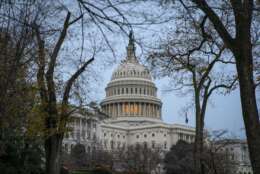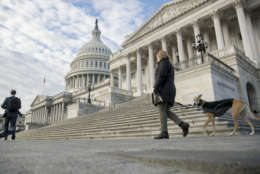federal pay raise
-
Capped pay rates went up in 2020, but salary compression is real for an ever-expanding group of federal employees within certain locality pay areas.
January 01, 2020 -
In today's Federal Newscast, new regulations to implement the paid parental leave law for federal employees are in the works.
December 30, 2019 -
The down side of the pay raise that takes effect next week is that more highly successful, long time civil servants will be hit by the pay cap.
December 30, 2019 -
For much of the federal workforce in 2019, what employees thought they knew about their pay, benefits, workplace flexibilities and even the location of their offices in some cases, were in flux.
December 27, 2019 -
The president's pay agent, a group composed of the Labor secretary and directors of the Office of Personnel Management and Office of Management and Budget, say the methodology behind federal locality pay doesn't make sense -- and hasn't made sense since its creation.
December 27, 2019 -
Actual 2020 raises for civilian employees will range from 2.85% to 3.52%, depending on where they work. Check out the 2020 locality pay rates OPM has released to see where you land.
December 27, 2019 -
The executive order implements 3.1% military pay raise on Jan. 1. Civilian employees will see similar increases in their first 2020 paycheck.
December 26, 2019 -
With little time to spare before the deadline, President Donald Trump signed two shutdown-averting spending bills into law and a 3.1% federal pay raise. He also signed the annual defense authorization bill, which includes a new paid parental leave program for most federal employees.
December 20, 2019 -
White collar federal civil servants are on track to get a 3.1% pay raise next year — the largest in a decade for 1.2 million civil servants.
December 20, 2019 -
The Senate has sent two minibus spending bills to the president's desk for his signature. President Donald Trump must sign both by Friday to avoid a second government shutdown in 2019.
December 19, 2019 -
Timing federal retirement right allows you to carry over the maximum amount of annual leave, and in 2020 be paid for most if not all of it at the new higher 3.1% pay raise.
December 18, 2019 -
The House has sent "minibus" spending bills, which include a 3.1% federal pay raise, to the Senate for its consideration. Congress must pass and the president must sign both bills into law by Friday to avoid a second government shutdown this year.
December 17, 2019 -
In today's Federal Newscast, USPS' Ethics Office wants to remind its employees about the restrictions applied to receiving gifts from customers and vendors.
December 17, 2019 -
A 3.1% federal pay raise is a key feature of one of two "minibus" spending bills, which congressional appropriators unveiled Monday evening. Both the House and Senate are expected to quickly vote on both this week before Friday's funding deadline.
December 16, 2019 -
For the second year in a row more than a million feds aren’t sure if they’ll be forced to come to work or be locked with or without pay over the holidays.
December 09, 2019














